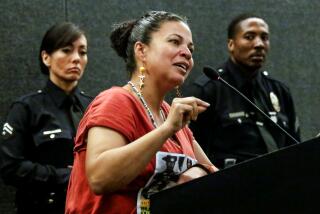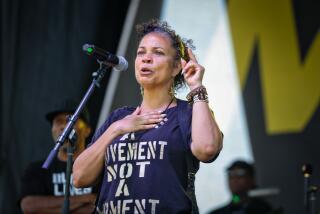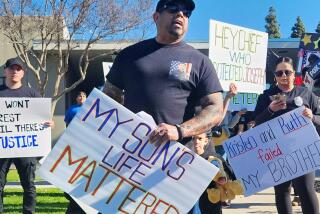Koon Gets Hostile Response at TV Taping : King beating: South-Central residents drown out sergeantâs defense of officers with shouts accusing him of racism while he tries to plug his book.
Los Angeles Police Sgt. Stacey C. Koon has weathered one trial for his involvement in the Rodney G. King beating and faces another, but perhaps the harshest judgment he has confronted came Friday on a sound stage at NBC studios in Burbank.
Appearing on the NBC talk show âA Closer Look With Faith Danielsâ to plug his new book on the case and the not guilty verdicts in the Simi Valley trial, Koon faced an angry audience of South-Central Los Angeles residents and leaders. The result was a clash that often left Koon drowned out by shouts accusing him of being a liar and racist.
âYou were found guilty by South-Central,â Malik Spellman said angrily to Koon. A member of Hands Across Watts, Spellman shared the stage with Koon during part of the program.
By the end of taping of two half-hour segments of the show to be broadcast Monday and Tuesday at 10:30 a.m., Koon appeared to have convinced no one in the audience of 100 that he is neither a racist nor a liar, and that the beating of King was within LAPD guidelines.
The anger--some of it spoken softly by older members of the audience, some shouted by young members--clearly showed that tensions in the area hit hardest by the riots remain high.
âWhat you see here is all that anger (that is) still not spent,â said state Sen. Diane Watson (D-Los Angeles), who was also a guest on the show with Danny Bakewell of the Brotherhood Crusade.
Audience members were invited through South-Central Los Angeles churches and civic organizations. They were required to walk through a metal detector before taking seats in front of a stage flanked by studio security guards.
Koon said he agreed to the confrontational format because he wants to stimulate change in the LAPDâs use of force policies through public awareness of its problems.
âOnly a masochist would come here and take this kind of abuse,â Koon quipped before the taping was five minutes old.
But the anger of the audience only became more intense when he sought to press his case. Koon said he and three other officers facing federal charges of violating Kingâs civil rights should not be blamed for the incident and its aftermath. At fault, he said, were the Police Departmentâs policies on the use of force, politics and the media that inaccurately reported the incident.
Koon said his book, âPresumed Guilty; The Tragedy of the Rodney King Affair,â shows step by step why the officers on the scene, under existing policy, had no alternative but to repeatedly strike King with batons. King was resisting and officers could no longer use a chokehold to subdue him, Koon said.
He said such incidents have occurred repeatedly for years, but only the King incident was captured on videotape.
âItâs ugly and inhumane and it should not happen in Los Angeles,â he said of the beating. But âI know I did nothing wrong.â
Koonâs claims that he is not a racist and that racism played no part in the incident angered the audience the most.
âWhat does âGorillas in the Mistâ mean?â audience member Rodney White shouted in reference to a police computer message sent by one of Koonâs co-defendants shortly before the King beating. âAre you going to tell me I didnât see what I saw (on the video?) Câmon man, Iâm not from Simi Valley.â
While Koon urged viewers to read his book and get the complete facts of the case, Bakewell urged the audience to ignore the $19.95 publication.
âDonât buy the book,â Bakewell said. âAll he is doing is trying to provoke America to make people buy the book.â
Many accusations hurled at Koon during the 90-minute taping were inaccurate and seemingly showed the power of misinformation and rumor in fueling anger and frustration.
An audience member accused Koon of doctoring the videotape of the beating shown on the program because it showed King getting up from the ground and taking a step toward an officer. But Koon did not provide the tape shown on the program and Daniels said it was a copy of the original.
Another audience member said police had killed one of Kingâs passengers a few months after the March 3, 1991, beating. In reality, the passenger was killed in a car accident. Another audience member said the audio of the King tape originally contained a racial slur in which King was referred to as a Mandingo. The tape contains no such slur. The reference to Mandingo was made by Koon in an early manuscript of his book, but later edited out after it was reported by the media.
Emotions were so high among members of the audience that Daniels--with Koonâs agreement--continued to work the crowd with the microphone long after the taping was over. Finally, when everyone had their say, Koon was hustled out of the sound stage by a security official. There were only jeers as he left.
More to Read
Sign up for Essential California
The most important California stories and recommendations in your inbox every morning.
You may occasionally receive promotional content from the Los Angeles Times.










